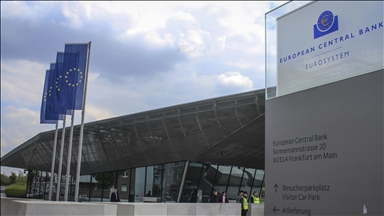ECB's quantitative easing is short-term fix: Experts
But the short-term improvement could lead to neglect of much-needed structural reforms

ANKARA
Experts say that the European Central Bank's decision to undertake a quantitative easing program is a short-term fix that could leave important issues unresolved.
The quantitative easing program is a means to inject liquidity into the economy. The central bank does this by buying bonds and government debt. The bank is planning an increase in the money supply of as much as 1 trillion euros to help revive the Euro-zone’s economy, as GDP expanded just 0.2 per cent last quarter and inflation is running at 0.4 per cent.
But experts were concerned about the long-term effects of the policy.
Providing liquidity works in the short term, warns Grigory Vilkov, professor of Finance at the Frankfurt School of Finance & Management.
It relaxes lending constraints and gives the economy a boost.
"However, very often such measures are short-term and do not really lead to the structural reforms needed for sustainable economic growth. Thus, full-blown quantitative-easing can create an illusion of well-being in the short run, but long-term problems will be left for the next generation," Vilkov said.
- Berlin versus Frankfurt
Berenberg Bank economist Christian Schulz agreed that the short-term effects of quantitative easing were beneficial: They include reduced borrowing costs for businesses, households and governments, a boost for financial market confidence and, hopefully, a boost for business confidence as well. And a loose money policy will push the euro lower against other major currencies, thus making exports cheaper.
But the policy involves risks, Schulz pointed out, especially political risks. Berlin is staunchly opposed to sovereign bond purchases. An open and shrill disagreement between Berlin and Frankfurt could undermine investor confidence and thus have the opposite effect of the one intended by the central bank. If the German economy were to rebound strongly from its current rough patch, Berlin's opposition could be very firm.
According to Schulz, emerging markets could benefit from more Euro-zone demand and more cheap money invested. Turkey might benefit, too.
"But for all emerging markets, the risk is becoming overly dependent on such 'hot money' inflows. Central banks might react with rate cuts to deter these inflows, which could lead to higher inflation rates in turn. It's a real challenge," Schulz added.
Cyrus De La Rubia, chief economist at HSH Nordbank in Hamburg, said that the quantitative-easing program would have "no effects significant for the real economy."
Rubia emphasized that the risk of bubbles causing excessive volatility would increase with a quantitative-easing program.
"Companies might feel uncomfortable about this increasing risk, and that could make them hold back on new investments. In this sense a quantitative easing program might be even counterproductive, as it could have a deflationary effect," he commented.
He pointed out that there would be no sustainable effect on growth, "even though stock markets may get a short term positive effect from such a slush of liquidity."
He added that the euro would loose further value against the U.S. dollar.
"However, as we expect the U.S. central bank to act carefully on rate hikes, the euro should hold at about 1.20 against dollar by the end of the year with a limited impact on exports. Inflation will not rise significantly even though central bank governor Draghi is hoping it will."
The Euro-zone economy rebounded slightly in the third quarter of the year after posting a near stagnation level of 0.1 percent in the previous quarter, according to European statistical office. Seasonally adjusted GDP rose by 0.2 percent in the Euro area and by 0.3 percent in the EU28 during the third quarter of 2014, compared with the previous quarter, according to Eurostat statistics released on Friday.
Separately, the Euro-zone inflation rate increased to 0.4 percent in October from 0.3 percent in September – its lowest point in five years – according to Eurostat. The reading suggests that moderate economic recovery seen in the zone’s 18 countries is still under pressure.
Anadolu Agency website contains only a portion of the news stories offered to subscribers in the AA News Broadcasting System (HAS), and in summarized form. Please contact us for subscription options.


